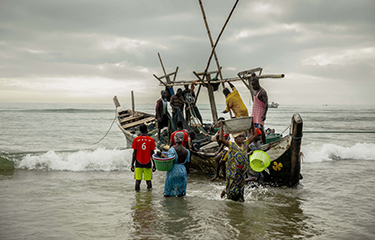Ghana’s inshore fishery is facing an imminent collapse, with serious repercussions on national food security and incomes for millions of people along the seafood value chain, according to a new report by Environmental Justice Foundation (EJF).
The report details how government reluctance to effectively tackle overfishing and illegal fishing by industrial trawlers, most of which are majority-owned by Chinese but operating under Ghanaian flags, has led to rampant violations of the rights of fishing communities.
“These communities are a vulnerable and marginalized group and urgent measures must be taken by Ghanaian government to ensure their basic human rights are upheld as required under international law,” the EJF report said.
EJF interviewed more than 215 small-scale fishers, processors, and traders for the report, with 50 percent of them reporting “going without sufficient food over the past year.”
More than 70 percent of those interviewed along Ghana’s seafood value chain were found to be living in deteriorating living conditions, with a similar number lacking sufficient clean water due to falling incomes and loss of livelihoods to illegal fishing.
The report has linked this lack of access to basic human rights to the Ghanaian government’s failure to stand up to the industrial trawling companies that have upped their game of “violating the right to work of small-scale fisheries and its workers.”
Ghana’s small-scale fisheries employ nearly 107,500 fishermen, an equivalent of 80 percent of Ghana’s fishing community. Another 500,000 people are engaged in seafood processing, distribution, and marketing, according to EJF.
EJF’s report affirms earlier findings of local fishers increasingly having to compete with industrial vessels to survive, “traveling further and further out to sea in search of catches.”
“This puts both the fishers, and the fishing equipment on which they depend, at risk,” EJF says. “Severe overcapacity of the trawl fleet combined with the illegal practice of ‘saiko’ – where industrial trawlers illegally target the staple catch of small-scale fishers and transfer it to specially adapted boats at sea – is driving the collapse of Ghana’s inshore fishery.”
In early June 2021, the European Commission issued Ghana a yellow-card warning, putting the West African country on notice it is considered a non-cooperating nation in the fight against illegal, unreported, and unregulated (IUU) fishing. The yellow card came after the government exhibited shortcomings in its ability to comply with its duties under international law as flag, port, coastal, or market country, the E.C. said.
“The fundamental human rights to decent work and an adequate standard of living are under threat in Ghanaian fishing communities,” EJF CEO and Founder Steve Trent said.
Trent said the Ghanaian government should work harder to ensure the sustainability and environmental security of its small-scale fishing communities.
"[Ghana must adopt] a rights-based approach to fisheries management, which prioritizes the needs of vulnerable small-scale fishing communities who make up the majority of fish workers in the country," Trent said.
There is a trend in Ghana’s fishing industry to ignore the small-scale fishing communities in decision-making, even when such decisions concern their livelihoods, Trent said.
“Improving governance of the sector through enhanced transparency, ending illegal fishing, reducing fleet capacity, reforming subsidies, and the development of realistic alternative livelihoods for fishing communities are all key steps that must be taken immediately,” Trent said.
He urged Ghana President Nana Akufo-Addo, who assumed office in 2020, to fast-track proposed reforms of the country’s fisheries law that provide “an opportunity to establish a clear and unequivocal legal basis to respect, protect, and fulfill the human rights of small-scale fishing communities, while ensuring environmental security and sustainability.”
Photo courtesy of the Environmental Justice Foundation







